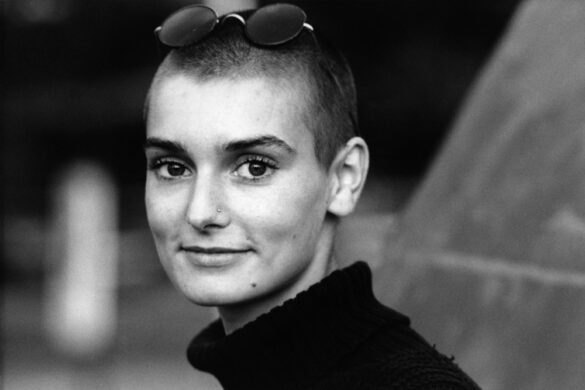Sinéad O’Connor was an Irish singer-songwriter known best for her 1990 hit, “Nothing Compares 2 U.”
- Died: July 2023
- Details of death: Died at the age of 56.
- We invite you to share condolences for Sinéad O’Connor in our Guest Book.
https://youtube.com/watch?v=0-EF60neguk%3Ffeature%3Doembed%26enablejsapi%3D1%26origin%3Dhttps%253A%252F%252Fwww.legacy.com
Sinéad O’Connor’s legacy
Born Dec. 8, 1966, in Glenageary, Ireland, O’Connor was raised in the Roman Catholic Church, an upbringing that would inform both her music and her controversial public persona. In a troubled childhood, she experienced the divorce of her parents and subsequent child abuse, later turning to shoplifting and truancy. It was while she was in a reform home for her bad behavior that she began exploring her musical talent, writing songs and recording a demo tape while still in her teens.
O’Connor started singing with the band Ton Ton Macoute in the mid-1908s, soon breaking off to pursue a solo career. Her debut album, “The Lion and the Cobra,” was released in 1987 and quickly gained a following both in Ireland and abroad. O’Connor was 20 years old and pregnant while recording it, soon to give birth to her first child, Jake.
The songs she created for her debut included “Mandinka,” a major hit in the U.K. and a college radio favorite in the U.S. She performed it on “Late Night With David Letterman” and later at the 1989 Grammy Awards, where she was nominated for best female rock vocal performance. Other singles from “The Lion and the Cobra” were “Troy,” another college radio hit, and “I Want Your (Hands on Me),” which was remixed with a rap interlude by MC Lyte and rose on the dance charts.
https://youtube.com/watch?v=Gf_RHVjPrHY%3Ffeature%3Doembed%26enablejsapi%3D1%26origin%3Dhttps%253A%252F%252Fwww.legacy.com
It was more than O’Connor’s striking music that brought her notice from the time of her solo debut. Her look was as unique as her sound – a delicate frame with large, dark eyes and a completely shaven head. O’Connor explained in a 2014 interview on “Oprah: Where Are They Now?” that she chose to shave her head in direct opposition to record executives’ attempts to style her in the early days of her career. “They wanted me to grow my hair really long and wear miniskirts and all that kind of stuff because they reckoned I’d look much prettier,” she says. “So I went straight around to the barber and shaved the rest of my hair off.” She went on to elaborate that she deliberately chose to make herself look less traditionally feminine to protect herself by discouraging attention from men.
O’Connor’s confrontational spirit was another aspect of her rise to notoriety. From the beginning, O’Connor was vocal about her political views, speaking freely about the issues that were important to her. It began with comments on the Irish Republican Army before she even released her first solo album, and it would come to a head a few years later, at the height of her fame from her follow-up album.
That album, 1990’s “I Do Not Want What I Haven’t Got,” was widely praised, selling more than 7 million copies and yielding the wildly successful single, “Nothing Compares 2 U.” Written by Prince (1958–2016), it was reinterpreted by O’Connor to raves, reaching the top of the Billboard chart and winning an MTV Video Music Award for video of the year, the first time a woman won that award.
A second single, “The Emperor’s New Clothes,” performed only modestly, but the album as a whole was considered a great success, later ranking on Rolling Stone’s list of the 500 greatest albums of all time. “I Do Not Want What I Haven’t Got” won a Grammy Award for best alternative music performance, though she refused to accept the nomination or attend the awards show, citing the over-commercialization of the ceremony as her reasoning. It was a move that generated controversy, but it was a rather small matter compared to what would follow in 1992.
https://youtube.com/watch?v=yhfATC9baPo%3Ffeature%3Doembed%26enablejsapi%3D1%26origin%3Dhttps%253A%252F%252Fwww.legacy.com
O’Connor was scheduled as the musical guest on the Oct. 3, 1992, episode of “Saturday Night Live,” performing first a cover of “Success Has Made a Failure of Our Home,” a track from her newly released album, “Am I Not Your Girl?” Her second song was another cover, of Bob Marley’s “War,” sung a cappella and with the lyrics somewhat changed to focus on child abuse. But as she sang the word “evil,” she held up a photo of Pope John Paul II and tore it into pieces, saying, “Fight the real enemy.”
It was a stand against an institution that she felt had wronged millions, but her stand didn’t have the effect she may have hoped for. Instead of drawing attention to injustice, O’Connor created a massive controversy about her own action and derailed the path of her career. A major public backlash against the singer resulted, including an incident two weeks later when she was booed off the stage at a Bob Dylan tribute concert.
Subsequent albums saw drastically reduced sales and chart performance, but O’Connor continued to record and perform regularly throughout the 1990s, 2000s, and beyond. She also continued to speak out about the issues that mattered to her, including a highly publicized open letter to Miley Cyrus in 2013. In it, she implored Cyrus to consider the message she was sending to fans through her sexualized appearance and persona, noting, “Women are to be valued for so much more than their sexuality.”
In 1999, O’Connor was ordained as a priest in the Irish Orthodox Catholic and Apostolic Church, which is not affiliated with the Roman Catholic Church. She had previously stated that she would have liked to be a priest in the Roman Catholic Church, which does not allow the ordination of women. In 2018, she converted to Islam, changing her name to Shuhada Sadaqat.
Notable quote
“Everyone wants a pop star, see? But I am a protest singer. I just had stuff to get off my chest. I had no desire for fame.” –from her 2021 memoir “Rememberings”





